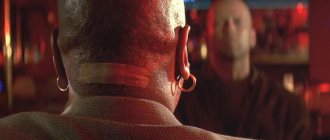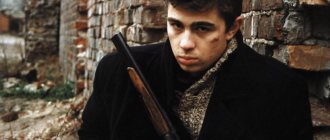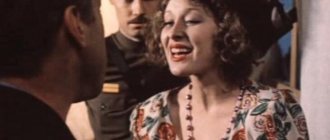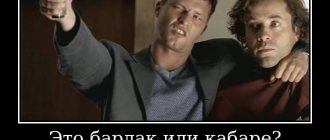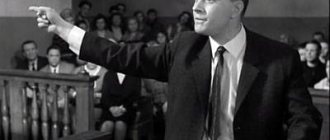Zhenya Raev
Quentin Tarantino is one of the most prominent directors of our time and a recognized representative of postmodernism in modern cinema. Add to this the director’s irrepressible passion for cinema of all kinds (from cheap Japanese horror films to Hollywood peplums) - and you get a huge number of references and homages to Tarantino’s favorite films in his own works.
Quentin never hid this, sometimes even honestly telling where this or that find in his next film came from. And today we will look at one of Tarantino’s most famous works, with which he won at Cannes - “Pulp Fiction”.
Opening credits
Let's start from the very beginning, that is, with the credits. The film's title (or rather, the font part of it) is copied from the little-known 1974 film Police Women.
Pulp Fiction subtitles
Credits for "Policewomen"
But the font of the remaining titles of “Pulp Fiction” repeats the typography from the 1972 film “Cabaret” with Liza Minnelli.
Pulp Fiction subtitles
Captions "Cabaret"
Suitcase
Tarantino spied the iconic shot with golden light from the suitcase in the 50s detective story “Kiss Me Deadly.”
But if in Robert Aldrich’s black and white film the glow had a practical meaning (there was a radioactive isotope inside the suitcase), then in Tarantino’s film the light has a symbolic meaning - it is the pure personification of the MacGuffin MacGuffin - Wikipedia.
Still from Pulp Fiction
Still from “Kiss Me Deadly”
What are the quotes?
Quotes from Pulp Fiction are a cultural code that distinguishes not only fans of a particular film, but also fans of Quentin Tarantino, and fans of arthouse cinema in general. They can be put on a status on a social network, they can be written on a T-shirt, they can be told as an original joke. But some Pulp Fiction fans don't stop there.
For example, Australian musician and blogger Christopher Bertke, better known online as Pogo, made an entire music video based on quotes from this film.
Bible quote
The passage from the Bible that Jules (Samuel L. Jackson's character) reads before the next murder is not taken from the Bible, as it might seem.
In the Book of the Prophet Ezekiel itself there is indeed a 25th chapter and a 17th verse, but it is much shorter. Only the end of Jules' monologue coincides with it: And I will take great vengeance on them with furious punishments;
And they will know that I am the Lord when I bring My vengeance on them.
And before that, in the original verse there is a mention of the Philistines (that is, no “the ways of the righteous” and “selfish tyrants”). Quentin actually took the lyrics from the 1976 Japanese martial arts film Bodyguard. There, a pseudo-biblical quote is placed in the opening credits, symbolizing the protagonist's rage and desire for justice.
The main role in the Japanese film was played by Sonny Chiba. Tarantino liked the actor so much that he later even invited him to play the role of Hattori Hanzo, a sword maker, in his film Kill Bill.
Le Big Mac
A separate theme of dialogue between Vincent and Jules, running through most of their conversations, is Vincent's travels around Europe and his stories about:
...everything is a little different there. I mean, everything there is exactly the same as here, only a little different...
Vincent and Jules on differences in the police system:
Vincent: They have a cop stopping you, but he doesn’t have the right to search. The cops don't have that right there!
Jules: That's it, I'm moving there, don't try to talk me out of it.
Vincent: I knew you'd appreciate it.
Vincent and Jules on European differences in hamburgers:
Vincent: Do you want to know what they call a quarter with cheese in Paris?
Jules: Don't they call it a quarter with cheese?
Vincent: It's all about the metric system. A quarter pound is an incomprehensible crap to them.
Jules: And what did they call him?
Vincent: They call it Royale with Cheese.
Jules: Royal and cheese? What then do they call “Big Mac”?
Vincent: A Big Mac is still a Big Mac. Only they call it “Le Big Mac”.
And now about potatoes and mayonnaise:
Vincent: Do you know what they have there, in Holland, instead of ketchup for potatoes?
Jules: I'm afraid to find out.
Vincent: Damn mayonnaise!
Jules: Holy shit!
Vincent: I saw it myself! And it doesn't come in a separate bowl for dipping, they just drown the potatoes in the damn mayonnaise!
A little later, the same question about the quarter with cheese is asked to the hostage, Brad:
Jules: Do you know why?
Brad: Because of the metric system?
Jules: Look, our Brad is brainy! Smart son of a bitch, that's for sure - he cleared everything.
Drawing a square in the air
When Vincent Vega and Mia Wallace arrive at the restaurant, Mia tells her companion, “Don't be like that...” and draws a rectangle with her fingers.
By this, she hints at the stable expression “Don't be a square,” meaning “Don't be a bore” (literally, “Don't be a square”).
And Tarantino borrowed the technique of visualizing a dotted rectangle from... “The Flintstones”! In one episode of the cartoon, Betty Rubble used exactly the same gesture to describe Fred Flintstone.
Images from The Flintstones
Images from "Pulp Fiction"
I won’t analyze the scene in the restaurant separately. There, every frame is filled with the spirit of films and music of the 50s and 60s, from Buddy Holly to Marilyn Monroe, but the references are spoken of in plain text.
Dance
Later in the restaurant, one of the most famous scenes of the film takes place - Mia and Vincent's twist at a local dance competition. There are two main allusions in this scene. In terms of the framing and some of the movements, this is “Eight and a Half” by Federico Fellini.
Scene from Pulp Fiction
Scene from "8 and a half"
And Tarantino himself said that the fragment was inspired by the dance scene from “Band of Outsiders” by Jean-Luc Godard.
Band of Outsiders is one of Tarantino's favorite films. He even named his studio after the film's original French title, A Band Apart.
Scene on the road
The episode when Butch leaves his apartment after killing Vega and sees Marcellus Wallace crossing the street also appeared for a reason. It is copied from the famous film “Psycho” by Alfred Hitchcock.
On the left are stills from Psycho, on the right are from Pulp Fiction.
By the way, you can see that Marcellus is carrying two glasses of coffee - he is going just to Butch’s apartment, where he and Vega were sitting in ambush. Butch arrived there a few minutes earlier and took Vincent by surprise, because the bandit thought that his partner had returned.
Secret of success
Many films hit the box office like colorful fireworks - star cast, special effects, twisted plot... They collect big box office and are forgotten. And some, not distinguished by a spectacular picture, remain in the memory for decades, and interest in them does not disappear. What is the reason? In good phrases! When said aptly and wittily, such quotes make any film akin to a literary work. Best lines from Pulp Fiction:
Jules:
“Don’t tell me about foot massage, I’m a damn master at this!”
Vincent: “Well, if you play with matches, then be prepared to get burned.”
Mia on awkward silence:
“Why does everyone have to talk about nonsense in order to feel at ease?”
Mia about men's gossip:
“If you men gossip, you are worse than housewives.”
Marcellus on aging boxers:
“If you think that the older you are, the better, you are wrong.”
Jules about his favorite hamburgers found on the hostages' table:
“If you’re talking about loving burgers, then you have to try these. As a rule, I don’t eat them - my girlfriend is a vegetarian, and that means I’m partly a vegetarian. But I can’t deny myself the taste of a quality cutlet.”
Fabian about his small belly:
“Not everything that is pleasing to the eye is pleasing to the touch.”
Wulf:
“It takes half an hour to get there, so wait in ten minutes.”
Jules:
“If my answers are scary for you, don’t ask scary questions.”
Bathroom Murder
The shot of Vincent Vega being killed (and Vega falling into the bathtub after being shot, tearing off the curtain behind him) echoes a shot from the 1975 film Three Days of the Condor.
Still from Pulp Fiction
Still from the film “Three Days of the Condor”
Fuckin good milkshake!
Some quotes are so capacious and resonant in the original that even Russian-speaking viewers are quoted without translation. Best quotes from the movie "Pulp Fiction" in English:
"Fuckin good milkshake!" - “Damn good milkshake!” Vincent Vega exclaimed this after trying a cocktail that, in his opinion, still does not amount to the price of five dollars. You can often hear this phrase pronounced in English after trying anything - any drink or even just some unexpectedly tasty food. If the father of the family is a fan of this film, he will definitely quote this when he takes a sip of his offspring's milkshake.
“Say “what” again!” - “Say “what” again!” In the hostage interrogation scene, a guy named Brad, out of fear, only answers “what?” to all of Jules’ questions. Jules loses his temper: “Say ‘what’ again and I’ll blow your head off!” From the film “Pulp Fiction,” quotes in English can be heard as often as in Russian, but if someone asks too often and repeats the word “what,” there is no doubt that a fan of the film will answer him in English, and even imitating the intonation of Samuel L. Jackson.
Motorbike
Butch's motorcycle, which he borrowed from Zed, is a clear allusion to the motorcycle models from the 1969 film Easy Rider.
Still from Pulp Fiction
Still from "Easy Rider"
For Easy Rider, the motorcycles were made to order in single copies (they are now in the museum), so it was not possible to get the same one for filming. But Tarantino easily solved the problem by using the motorcycle on which the Rider was based - the Harley Davidson Super Glide.
By the way, this is not the only reference to “Easy Rider”: in the toilet, Mia Wallace quotes the song Pusher by Steppenwolf, which was the title tune of the film.
Cleaner
The character Winston Wolfe, played by Harvey Keitel, appears in the film - he is a man who solves problems and gets rid of the unwanted consequences of murder.
On the left is a frame from “The Killer”, on the right is from “Pulp Fiction”
He played exactly the same role in the 1993 film “The Killer,” playing Victor the Cleaner. This is a remake of the French film “Her Name was Nikita”, where the role of Victor was played by Jean Reno.
Keep up, Ketchup!
One of the film's sparkling jokes is Mia's "not funny" joke about the Tomato family. Despite the untranslatable play on words, this joke still became a quote from Pulp Fiction in Russian.
Mia: Three tomatoes are coming: daddy Tomato, mommy Tomato and son Tomato. Son Tomato keeps falling behind, and Dad Tomato starts to get angry. He walks up to his son, steps on him and says, “Keep up, Ketchup!”
In the original, the last phrase sounds like a play on words - “ketchup” - ketchup and “catch up” - catch up, catch up.
